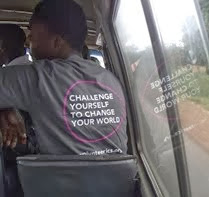by Isabel Bennett
Last week we began work in our four rural communities that
surround Lafia. I am in the Keffi Wambai team with Kayleigh, Patrick, Pelumi
and Nabila, and the other communities are Kireyi, Duduguru and Gidan Maiakuya.
We work in the communities every Monday, Wednesday and Friday- two days spent
conducting sessions with farmers, and one day spent in schools running ‘Young
Farmers’ clubs.
The first session we led with farmers last Monday was on
‘Group Formation’. There are many benefits to farmers working in groups-
competition will be reduced, they can pool together resources and tools and
buyers can no longer work them against each other to drive prices down as they
can all decide on the same selling price, which leaves room for profit. Also,
being part of a cooperative savings and loans group (which we are running a
session on soon) will mean that the farmers can take out small short term loans
and share the task of record keeping, meaning that if any of them need to apply
for a loan from a bank they will be more likely to receive it, as banks are
unlikely to lend to individual farmers if they do not have sound finance
records.
The first challenge of beginning our sessions is mobilising
people. I was lucky, as in Keffi Wambai we had over 80 people turn up to our
first one! We run the sessions on benches outside under a tree, as this is a
point in the village that many people pass by and we have lots of space here. In
all of the communities we are linked to CAEVs (Community Agricultural Extension
Volunteers) who can help us to spread the word around about our events and help us
to reach new people. Our aim is to have about 50 attendees at every session, so
80 was a bit overwhelming! The session went well though- we did presentations, role-plays
and group discussion work- and it seemed that a lot of the farmers there wanted
to form groups and they definitely understood the benefits of doing so. Another
challenge is translation, as in the communities not many of the adult farmers
understand English, with the local language in Keffi Wambai being Eggon. We managed to
find some people who were willing to interpret for us, but when I was working
with a small group to try and get a discussion going the man who was
interpreting would just answer the question himself without asking the others
for their opinions. I really wanted the women to give their views but he wasn’t
allowing them to either. I now know how important it is to be working with an
interpreter who is there to help our sessions, not just to give their own
opinions.
The second session we ran was on ‘Clearing of land’ as many
farmers here burn their land to clear it and do not understand the negative
effect this method will have on their next harvest. At this session we had
about 35 people turn up, which showed that perhaps last time people were just
curious! We are trying to make sure we get people’s names and phone numbers so
that we can personally stay in touch with them and inform them of the upcoming
sessions. I am beginning to see that one of the great things about running
these sessions with the farmers is that they allow for the farmers to
share and discuss their work with one another, something that they may
otherwise not be doing in such a large group. It was really encouraging to hear
one man stand up and tell the whole group about the way he clears his land- by
gathering the weeds and residues and arranging them between the furrows, where
they decompose and fertilise the soil.
Our Young Farmers Clubs are under way now too. In Keffi
Wambai we have been linked to two schools, a Junior Secondary and a Senior
Secondary. We had about 70 young children on our first day at the junior
school, all very excited that we were there! At the senior school the children
are much older, around 15 years old I think and so each week we are planning
different agendas for the two. Young Farmers Clubs seem to be quite common
here, their aim to encourage young people in these rural communities to be
interested in farming and to understand its importance. At the senior school,
almost everyone wants to be a doctor or a lawyer when they’re older, and nearly
all of their parents are farmers. We are not discouraging other career choices
such as these- but trying to show that some people could do both, or that they
at least could farm at some point in their life. We would like to show them the
importance of the farms in and around their communities, as the older
generations fear that children will leave to go to the cities when they finish
school, and there won’t be enough farmers to continue the work.
I am enjoying the work so far, we’re getting very busy now
with training and then planning of more sessions, but it is rewarding to see
people understanding the information we are bringing to them. I’m also loving
being in the Keffi Wambai community as a lovely woman cooks lunch for us each
time after we finish our session!








0 comments:
Post a Comment